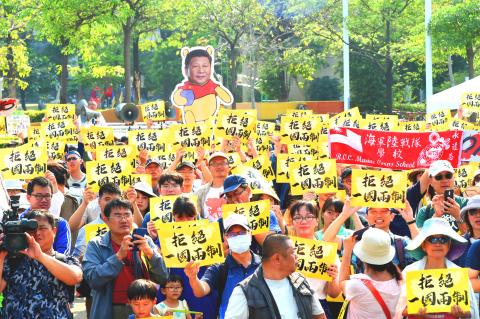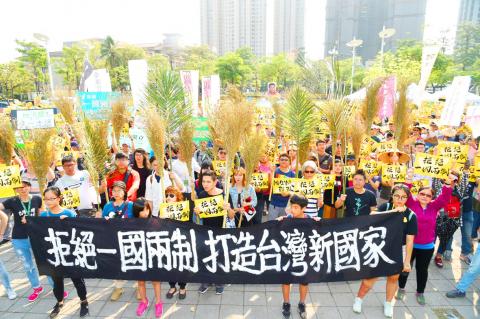A group of about 1,000 people yesterday protested in Kaohsiung’s Labor Park against China’s proposal to implement a “one country, two systems” framework in Taiwan.
The march, organized by Citizen Front Taiwan, also protested Kaohsiung Mayor Han Kuo-yu’s (韓國瑜) visits last month to China’s liaison offices in Hong Kong and Macau.
Critics said the visits were inappropriate and suggested that Han accepts China’s “one country, two systems” model.

Photo: Chang Chung-yi, Taipei Times
The protesters shouted “Today Hong Kong, tomorrow Taiwan” and “Reject ‘one country, two systems,’ resist Chinese annexation” and other slogans.
By visiting the offices and signing a memorandum of understanding on fruit exports with Chinese officials, Han is “returning to the old ways of [former president Ma Ying-jeou’s (馬英九)] administration,” Sunflower movement leader Lin Fei-fan (林飛帆) told the crowd, accusing Han of “locking Taiwan into a ‘one China’ framework” in the name of boosting the economy.
Ma “placed all of Taiwan’s resources into China” during his presidency, like putting all of one’s eggs in one basket, Lin said.

Photo: Chang Chung-yi, Taipei Times
As a result, Taiwan’s economy became reliant on China, he said.
“Are we going to go back to the old ways?” he asked.
Han did not give prior notice of his visits to the offices, said Citizen of the Earth, Taiwan chairman Lee Ken-cheng (李根政), who also serves as an organizer of Citizen Front Taiwan.

Photo: Ko Yu-hao, Taipei Times
By entering the offices, Han “cooperated with Chinese President Xi Jinping’s (習近平) ‘united front’ strategy,” Lee said.
Biased information from China makes it impossible for people to access correct information, Citizen Front Taiwan organizer Shen Pai-yang (沈柏洋) said.
National security officials need to act on the “information war” the nation is facing. Many countries are slowly being infiltrated by China, but the most serious case is Taiwan, which is the least able to resist infiltration, he added.
Edith Cheung (鍾慧沁), who in September last year immigrated from Hong Kong, said Hong Kongers only became poorer after the “one country, two systems” model was implemented there.
Real-estate prices went up due to Chinese buyers, and young Hong Kongers, faced with competition from China, could not find jobs, she said.
Charng Mei (常美冰店), an ice cream store in Cishan District (旗山), showed its support by sending 300 popsicles to the protesters.
The Kaohsiung City Police Department dispatched 100 police officers to the park to prevent any clashes between the protesters and members of the public.

Tropical Storm Gaemi strengthened into a typhoon at 2pm yesterday, and could make landfall in Yilan County tomorrow, the Central Weather Administration (CWA) said yesterday. The agency was scheduled to issue a sea warning at 11:30pm yesterday, and could issue a land warning later today. Gaemi was moving north-northwest at 4kph, carrying maximum sustained winds near its center of up to 118.8kph and gusts of 154.8kph. The circumference is forecast to reach eastern Taiwan tomorrow morning, with the center making landfall in Yilan County later that night before departing from the north coast, CWA weather forecaster Kuan Shin-ping (官欣平) said yesterday. Uncertainty remains and

SEA WARNING LIKELY: The storm, named Gaemi, could become a moderate typhoon on Wednesday or Thursday, with the Taipei City Government preparing for flooding A tropical depression east of the Philippines developed into a tropical storm named Gaemi at 2pm yesterday, and was moving toward eastern Taiwan, the Central Weather Administration (CWA) said. Gaemi could begin to affect Taiwan proper on Tuesday, lasting until Friday, and could develop into a moderate typhoon on Wednesday or Thursday, it said. A sea warning for Gaemi could be issued as early as Tuesday morning, it added. Gaemi, the third tropical storm in the Pacific Ocean this typhoon season, is projected to begin moving northwest today, and be closest to Taiwan on Wednesday or Thursday, the agency said. Today, there would likely

DISRUPTIONS: The high-speed rail is to operate as normal, while several airlines either canceled flights or announced early departures or late arrivals Schools and offices in 15 cities and counties are to be closed today due to Typhoon Gaemi, local governments announced last night. The 15 are: Taipei, New Taipei City, Taoyuan, Tainan, Keelung, Hsinchu and Kaohsiung, as well as Yilan, Hualien, Hsinchu, Miaoli, Chiayi, Pingtung, Penghu and Lienchiang counties. People should brace for torrential rainfall brought by the storm, with its center forecast to make landfall on the east coast between tonight and tomorrow morning, the Central Weather Administration (CWA) said. The agency issued a sea warning for the typhoon at 11:30pm on Monday, followed by a land warning at 11:30am yesterday. As of

CASUALTY: A 70-year-old woman was killed by a falling tree in Kaohsiung as the premier warned all government agencies to remain on high alert for the next 24 hours Schools and offices nationwide are to be closed for a second day today as Typhoon Gaemi crosses over the nation, bringing torrential rain and whipping winds. Gaemi was forecast to make landfall late last night. From Tuesday night, its outer band brought substantial rainfall and strong winds to the nation. As of 6:15pm last night, the typhoon’s center was 20km southeast of Hualien County, Central Weather Administration (CWA) data showed. It was moving at 19kph and had a radius of 250km. As of 3pm yesterday, one woman had died, while 58 people were injured, the Central Emergency Operation Center said. The 70-year-old